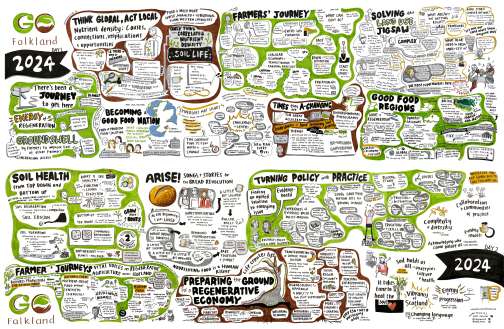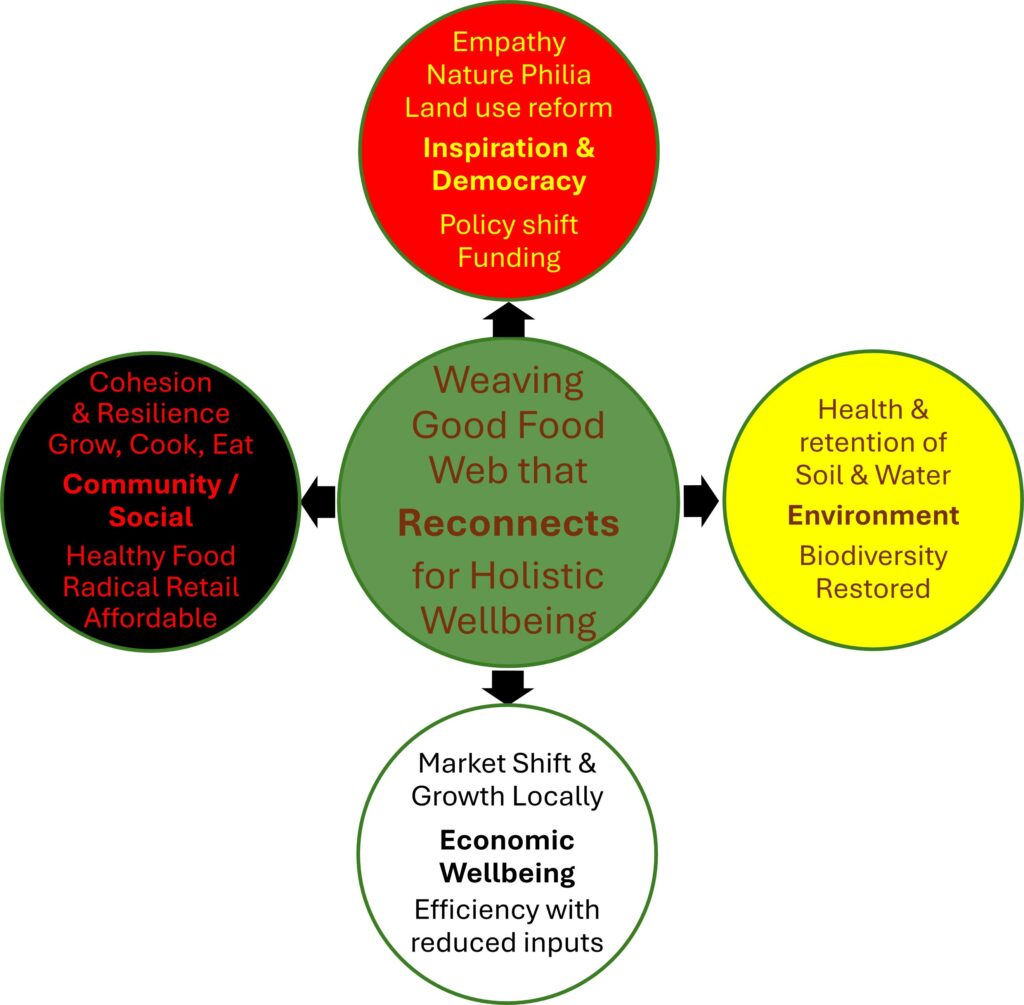Scottish community ready to embrace regenerative farming and sustainable local food
The wellbeing benefits of nature, a desire for education, and interest in policy change were some of the positive findings to come out of a survey, of farmers, foresters, other land users and local food champions, on attitudes to regenerative farming and local Good Food systems in Scotland.
Organised by the Falkland Stewardship Trust (FST), in Fife, with funding from AFN+ Network’s Stakeholder FlexFund, the project set out to explore attitudes to net zero and appetite for food system change among attendees at GOFalkland Regenerative Agriculture Gathering in July 2024. The Gathering explored themes across the food system from government policy, farm succession, regenerative growing, radical retail, soil to human health, and holistic wellbeing, aiming to co-design and collaborate on creating a healthier and fairer future for Scotland’s land use and food system.

A comprehensive survey and accompanying analysis, had responses from 78 attendees from sectors including farming, forestry, education, food sustainability and food systems change. It revealed enthusiasm and broad interest in regenerative farming and sustainable local food systems, with particular interest in learning opportunities and government support. The results will be hugely valuable in understanding the motivations and barriers from a mixed group of people who interact with land issues in the area, including food production and sustainability.
Within the survey, the analysis identified a group of 38 innovators in regenerative farming or sustainable local food systems, who will contribute knowledge, research and networking skills toward a future ‘community of practice’ across Scotland and the UK.
Almost 80% said they are taking actions to increase sustainable and local food systems within their organisation, with a similar proportion already taking steps to learn more about regenerative agriculture. Respondents identified key barriers as funding and policy, as well as information about the financial implications of regenerative farming on their business. In terms of solutions, respondents felt consumer support is essential for growth in regenerative farming, alongside robust peer support and a national network to help develop technical knowledge.
Analysis of the survey found that the strong opinions in favour of system change and improved education suggest “fertile ground for acceptance of innovation and changes to practices”.
The desire for education was backed up by the survey’s questions around awareness. Only around 10% of respondents were aware that the majority of agricultural products in Scotland are exported, and there was significant underestimation of consumer support for regenerative farming. Research shows that, in Scotland, 68% of the public support ‘sustainable’, and 55% support ‘ethical’ agriculture, whereas in this survey, 66% of respondents estimated low consumer support for regenerative farming.
Regenerative farming and local food systems remain key tools for achieving net zero within the agri-food system, as well as producing food in a way that is resilient to climate and other food system shocks. As new tariffs put in place by US President Donald Trump radically reshape global trade, sustainable and local food systems are only becoming more attractive as a resilient option for food security. In addition, with 18 of the 19 warmest years having occurred since 2000, large-scale monocultures of key crops are increasingly fragile and open to climate risks. Regenerative farming’s ability to restore soil health, which produces healthier food, allows farmers and food producers to create a sustainable farming business that can better withstand climate shocks.
The Falkland Stewardship Trust project has demonstrated a “clear call for change” that could help expand regenerative farming and food systems with local communities, and across Scotland. Work is ongoing to develop a Community of Practice and take the learning within the survey report forward.

Within that bigger picture, understanding the attitudes to regenerative farming and local food among diverse land users and communities could unlock the potential of both systems. This insight could also yield common goals, as demonstrated by the FST survey, rather than the polarisation of views in food and farming that are often emphasised on social media.



